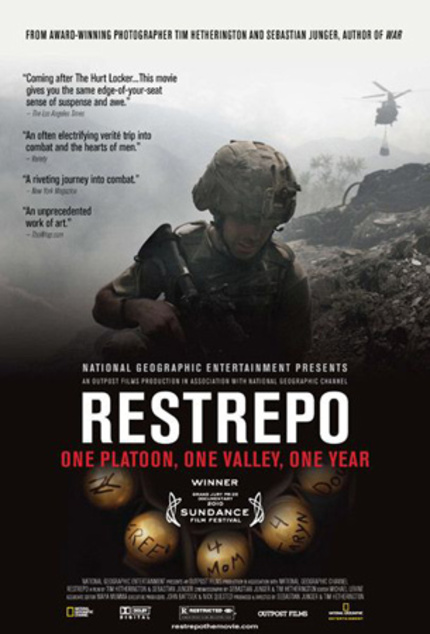RESTREPO Review

"Restrepo" is a war film unlike any that you have seen before. Partly, because most war films you have seen were probably not documentaries; but mostly, because it plunges you deep into the heart of war in a way that Francis Ford Coppola, Oliver Stone or even Kathryn Bigelow have not come nearly as close to doing. Not just any war, mind you, but the war of the moment, into what is unanimously considered one of the most dangerous regions of the conflict.
Beginning in June 2007, filmmakers Sebastian Junger and Tim Hetherington bunkered down with Second Platoon, making a total of ten trips to the Korengal Valley of eastern Afghanistan on assignment for Vanity Fair and ABC News. Capitalizing on the opportunity, they decided to piece together a documentary from the 150+ hours of footage that they obtained of the company. Upon satisfying their subjects that there would be no political overtones to the finished product, they were trusted enough to be exposed to the full reality of modern warfare in a way that few outside the military could ever hope to be.
The results are both fascinating and unexpected. Interspersed with the in-field footage are candid interviews of the soldiers taken from their base in Italy, which reveal a depth to their personalities that strongly encourages us to identify. Who wouldn't be disgusted, for example, on hearing that one's next posting would be in an area notorious for its high casualty rate, with an infrastructure so skeletal that one would be forced to burn one's own faeces in order not to alert the enemy? On the other hand, there are moments when the soldiers discuss their targets with such an alarming lack of humanism that one is inclined to view them as little more than black-hearted killing machines; until, that is, one recognizes that it is this mind-blocking mechanism that is the very proof of their humanity.
More than anything else, the film succeeds in placing us on the level of the soldiers, and as such, it falls more comfortably under the heading of "necessary viewing" than "entertainment." During their one-year deployment to the remote outpost named after a fallen member of their detachment, their struggles are as much taken up with the fight against long stretches of boredom - or winning the hearts and minds of the local villages - as they are with the detection and elimination of a largely invisible enemy. Indeed, some of the most affecting scenes involve watching the soldiers interact with the village elders, from the weekly "shura" that the captain holds to address their concerns, to the large commotion caused by the inadvertent death of a cow.
None of this is to imply that there is any shortage of combat. When the bullets fly, they do so thick and fast, and many of the worst perils of battle find their way on to the camera. Bravery, in these circumstances, is pared down to its unglamorous essence, as the survival of the unit demands that the fight continue, despite the death of a comrade, or the moral scars left by the taking of innocent lives. The human dimension is never omitted from the equation - it cannot be - and the conclusions one draws as a consequence are often as devastating as they are reassuring. In the same vein as The Hurt Locker, for instance, the heat of battle is conveyed as a powerful addiction for many of the soldiers, with one of them even describing it as "crack." One can only imagine how difficult the adjustment back to normal society must be for these men, who have dedicated their lives to fighting for its protection.
Ultimately, it is from this acknowledgement that a documentary like "Restrepo" draws its power. Unlike the mediated versions of war that we experience on the news or in Hollywood movies, this is war as it actually occurs: we are not permitted to flinch, or to avoid thinking about the sacrifices involved, when our leaders make the weighty decision to march our soldiers into battle.
"Restrepo" is released on June 25th.







